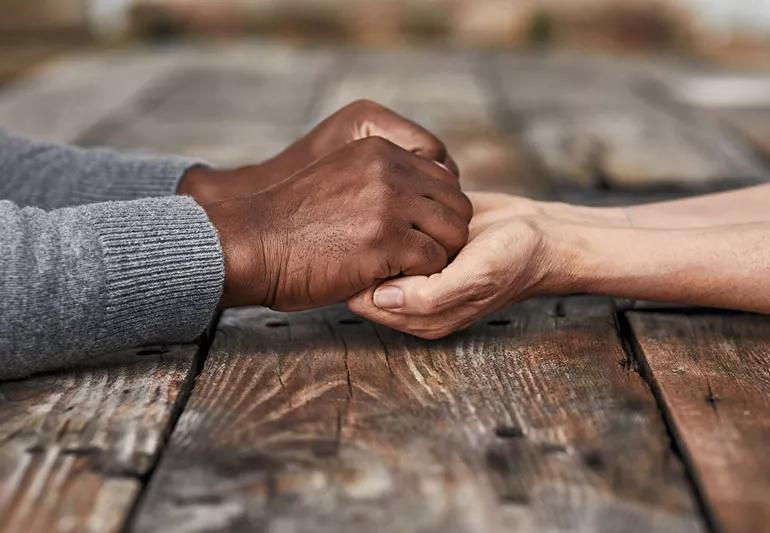Practice meditation together, make a unique-to-them care package and embrace emotions

Cancer. It’s a big, scary word. And when someone in your family or a dear friend is diagnosed with cancer, strap yourself in. You’re facing a roller coaster of a ride.
Advertisement
Cleveland Clinic is a non-profit academic medical center. Advertising on our site helps support our mission. We do not endorse non-Cleveland Clinic products or services. Policy
As their emotions go up — and then down — so will yours. There will be good days and there will be bad days.
“The cancer experience is always changing,” explains clinical psychologist Melissa Walt, PsyD. “Not just for the patient, but for loved ones, as well.”
And it’s important that you’re there to offer your support during their cancer journey — but that you also think about how their cancer diagnosis might affect you and how you interact and support your loved one.
Dr. Walt offers some tips on how to support someone with cancer.
Here are nine things Dr. Walt recommends you keep in mind when your loved one is dealing with cancer.
Sadness is a typical response. When your loved one says, “I’m fine,” but you suspect otherwise, reach out. Try saying, “You know, you’re looking kind of sad. I haven’t seen you smile in a while. What’s going on?”
“Talking about feelings is hard for a lot of people. Talking about cancer is also hard,” notes Dr. Walt. “Many patients worry that telling their loved ones or friends that they’re scared or sad will make them worry about them. Others keep their feelings to themselves because they feel like they would be burdening others if they opened up.”
That’s why learning helpful ways to check in with your loved one or friend with cancer is important.
Advertisement
“If your loved one or friend with cancer tells you how they’re feeling, express your love to them, let them know that you’re there for them and give them permission to feel whatever they’re feeling,” advises Dr. Walt. “Meet them where they are. Dismissing their fears and worries often shuts down important conversations. Even if they’re hard to have, they can bring you and your loved one or friend close together.”
It’s entirely appropriate for your loved one (or you) to be angry about a disease that will change life as they (and you) know it. It’s not OK to take it out on others. Seek help to vent and get a reality check on your feelings.
“It’s completely normal and natural to feel angry toward cancer. Remember, there will be good days and bad days for you, as well as for your loved one,” shares Dr. Walt. “It’s important to check in with yourself and your loved one each day. If you notice that you or your loved one has been more irritable, there are several things to consider. Are you sleeping well while also juggling caretaker responsibilities? Is your loved one with cancer getting enough sleep? How are you or your loved one feeling, physically?”
Remember, too, that it’s not uncommon to feel more irritable when dealing with an illness — your loved one may be experiencing nausea, vomiting, pain or fatigue.
“Feeling angry about cancer is OK but beware of more serious signs like physical or verbal aggression,” advises Dr. Walt. “If you or your loved one with cancer is experiencing anger and having a hard time managing it, it may be a sign of depression or anxiety. It would be a good idea to talk to your doctors about this or reach out to a mental health professional for coping strategies to manage anger in a healthy way.”
It’s OK to have feelings. But you don’t want to stay in them. Share your emotions, thoughts and feelings honestly and clearly with your loved one. You don’t want them to wonder, “What else aren’t they telling me?”
“Just as you may want your loved one or friend with cancer to open up to you, they may want the same from you. Or if neither of you really wants to open up, remember that it’s really important that you do,” encourages Dr. Walt. “You can start by practicing through journaling. This can help you identify and label your feelings. As you get more comfortable thinking about feelings with yourself, practice sharing them with your loved one with cancer.”
Keep in mind that talking about cancer can be emotionally intense for you and the person with cancer.
“It’s OK to disagree, even stop or delay a conversation when it’s not moving in a productive way,” explains Dr. Walt.
Advertisement
Mindfulness — the idea of being in the moment — can have a positive impact on the immune system, anxiety and sleep. One of the best ways to practice mindfulness is with meditation — and you can do this with your loved one. Watch thoughts come in. Acknowledge them without getting upset. Then, let them fade.
“Mindful meditation is a very helpful skill to learn to help you cope with cancer and treatment,” says Dr. Walt. “There is a lot of research that suggests that meditation can help manage stress in a way that can improve someone’s quality of life despite cancer by boosting their immune function, calming feelings of fear, uncertainty and lack of control, and managing difficult symptoms and side effects.”
Try breathing from the diaphragm with your loved one whenever cancer triggers fear of the future. Watch the breath as you inhale and exhale. Let it settle you into a calm space and bring you back to the present.
“Your breath is a powerful tool and you can learn to breathe in a way that can help you feel less stressed or tense,” notes Dr. Walt. “Diaphragmatic breathing, or deep breathing, is very easy to learn and requires nothing more than you and your breath.”
You can try deep breathing right now by finding a comfortable position and closing your eyes. Engage all of your senses as you breathe in and out. Imagine if your breath had a shape or texture. What does it feel like to breathe? Listen to the sound of your breath. Observe what you see behind your closed eyes. Notice any subtle taste or smell in breath. Imagine the rhythm of your breath and visualize your breath touching every corner of your body. Continue to sit, observe and breathe.
Advertisement
“Pay attention to how you’re feeling after you practice deep breathing,” says Dr. Walt. “Maybe you notice less intense sensation in certain parts of your body. Maybe your mind is less active or full. Practice this at least once a day. Don’t forget to share this tool with family and friends.”
It doesn’t matter whether your loved one attends church, synagogue, a mosque or none of the above. A deeper spiritual connection can bring tremendous comfort along the cancer journey.
“While religion and spirituality are important to some, be sensitive to others’ beliefs or lack thereof,” suggests Dr. Walt. “It’s not uncommon for people with cancer to question their beliefs about God and some people don’t believe in God at all.”
For those with religious and spiritual beliefs, they may find comfort in talking with their priest or spiritual leader.
“For those struggling with their faith in the midst of cancer, know that you’re not alone and that this is a common experience,” stresses Dr. Walt. “Reach out to your religious/spiritual community for support. For nonreligious people, finding a way to connect with sources of meaning and hope in life despite cancer can be helpful.”
Look for support centers that offer those with cancer, families and friends a peaceful, safe space to connect with others on this journey. Support groups, art therapy, yoga, exercise classes and other services are typically free.
Advertisement
“It’s important to remain connected with others when you or a loved one has been diagnosed with cancer,” explains Dr. Walt. “Turn to the people you trust and talk to them about difficult thoughts and feelings you might be experiencing.”
Also, make time for fun. Consider planning a weekly telephone call with a close family member or friend. Or plan regular outings with people you enjoy spending time with, suggests Dr. Walt.
“Many times, people with cancer may not feel well enough to have visitors or go out. That may have also gotten directions from their doctors to limit their interactions with others. In this case, phone calls and FaceTime are handy tools,” she notes.
“Support groups are available for cancer patients and anyone else touched by cancer and are great ways to meet other people who are going through similar experiences. Support groups come in many shapes and sizes and it may take time to find the best fit for you. Be patient.”
Putting together a care package for someone with cancer can provide them with activities and self-care opportunities. Do they like to read? Get a few of their favorite books. Consider including their favorite snacks, a blanket and wellness items like a relaxing face mask or hand lotion.
“Think about how exciting it is to receive a card or gift in the mail. Reaching out to someone who is going through cancer can be all it takes to make their day,” says Dr. Walt. “If nothing else, it can change their focus onto something more positive and uplifting.”
When thinking about what to send or do for someone who is going through cancer (patient or caretaker), think about their interests, as well as how they might be feeling. People going through treatment may be experiencing brain fog or difficulty concentrating. Their taste buds have also likely changed, or they’re experiencing nausea or vomiting.
“A card or handwritten letter is a great way to let someone know you are thinking about them,” Dr. Walt continues. “Mowing their lawn or shoveling their driveway, delivering groceries or driving them to an appointment are also nice gestures.”
Sadness can morph into depression. If your loved one starts withdrawing, clamming up or sleeping too much, seek help from a psychologist or licensed social worker.
“Feeling sad, angry or anxious about cancer is normal, and most people experience these feelings to some degree when they or someone they care about has cancer,” explains Dr. Walt. “However, if you notice your loved one’s day-to-day routine changing or that they’re more withdrawn or their work is negatively affected, these are signs that they may be struggling with depression or anxiety.”
Therapy or medications can be very helpful. Reach out to your doctor or a mental health professional to talk about ways that they can help you and your loved one cope during this difficult time.
Remember, cancer doesn’t happen in a vacuum. Everyone feels its ripple effects. Families and friends are also on board for the ride.
“But when emotions disrupt their life — when they’re angry so often they can’t have a conversation, or when anxiety or fear keep spinning out of control — reach out and get them the care they (or you) need,” encourages Dr. Walt.

Sign up for our Health Essentials emails for expert guidance on nutrition, fitness, sleep, skin care and more.
Learn more about our editorial process.
Advertisement

Chemo cold caps may help you keep more of your hair during therapy

From a thoughtful note to a special pillow, these items are a win

How to create your own organizational system

Take these steps to limit the damage

The short answer from an exercise physiologist

The short answer from an oncologist

10 things that can help ease your mind and keep you comfortable

Before you start planning, ask yourself these questions

Even small moments of time outdoors can help reduce stress, boost mood and restore a sense of calm

A correct prescription helps your eyes see clearly — but as natural changes occur, you may need stronger or different eyeglasses

Both are medical emergencies, but they are very distinct events with different causes